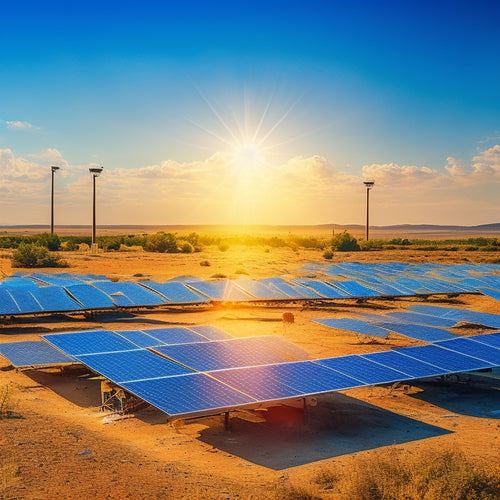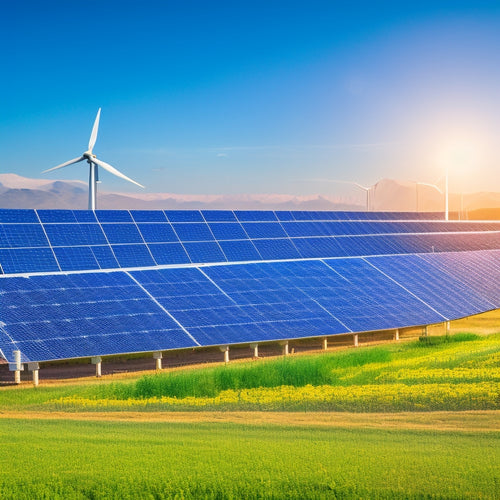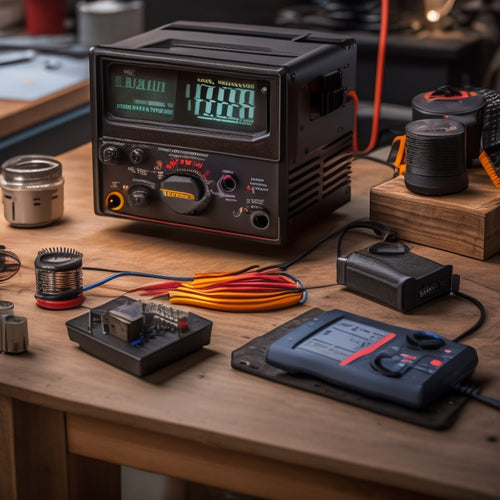
5 Best Inverters for Water Pumping Systems
Share
When selecting an inverter for your water pumping system, you require a reliable and efficient solution that can handle the demands of continuous operation. Top brands like Schneider Electric, ABB, and Siemens offer high-performance and efficient solutions. Look for advanced technology features like maximum power point tracking (MPPT) and pulse-width modulation (PWM) to guarantee maximum efficiency under varying energy conditions. Proper inverter selection based on pump wattage is essential, and you should also consider compatibility with solar panels, battery chemistry, and voltage. By evaluating these factors, you'll be well on your way to finding the perfect inverter for your water pumping system, and exploring further will reveal even more key considerations to secure optimal performance.
Overview
- Schneider Electric, ABB, and Siemens are top inverter brands for water pumping systems, offering advanced and efficient solutions for uninterrupted operation.
- Inverter features like MPPT and PWM ensure maximum efficiency under varying energy conditions, making them essential for reliable water pumping.
- Compatibility with solar panel arrays, battery chemistry, and voltage is crucial for optimal system performance and preventing damage.
- Inverter selection should be based on pump wattage, with guidelines ranging from micro-inverters for <1 kW pumps to utility-scale inverters for >20 kW pumps.
- Durability and reliability are vital, with features like temperature and humidity resistance, regular maintenance, and warranty options ensuring consistent operation.
Top Inverter Brands for Water Pumping
Reliability is the cornerstone of any water pumping system, and the inverter you choose plays a critical role in guaranteeing uninterrupted operation. You need an inverter that can handle the demands of your pumping system, and that's where top inverter brands come in.
Brands like Schneider Electric, ABB, and Siemens have made significant inverter technology advancements, offering high-performance and efficient solutions.
When selecting an inverter, it's crucial to take into account energy requirements and sizing to verify the inverter can handle the daily energy consumption of your pumping system.
Additionally, evaluating the inverter's inverter efficiency and performance will help you choose a reliable and efficient solution.
Inverter Features for Efficient Pumping
Operating a water pumping system efficiently relies on selecting an inverter with the right features. You want an inverter that maximizes energy efficiency, reducing your energy consumption and costs.
Look for inverters with advanced inverter technology, such as maximum power point tracking (MPPT) and pulse-width modulation (PWM). These features guarantee your pump operates at its maximum efficiency, even under varying energy conditions.
Moreover, advanced inverter technology enables real-time monitoring and control for peak energy harvesting real-time monitoring, allowing granular control over production and consumption.
Additionally, consider inverters with built-in monitoring and control capabilities, allowing you to track your system's performance and make adjustments remotely.
These features will help you achieve the most energy-efficient pumping operation possible, giving you the freedom to manage your water supply with confidence.
Solar Inverter Compatibility Matters
When selecting an inverter for your water pumping system, you'll want to verify it's compatible with your solar panel array. The type of solar inverter you choose will greatly impact the overall performance of your system.
There are three main solar inverter types: string inverters, power optimizers, and microinverters. Each has its advantages and disadvantages, so it's vital to choose the one that best suits your system's requirements.
Inverter compatibility with battery chemistry, voltage, and charging requirements is essential for preventing damage and system failure. Additionally, technical specifications of inverters should match battery bank requirements to avoid inefficiencies.
Additionally, inverter installation tips, such as confirming proper grounding and sizing, are important to guarantee safe and efficient operation.
Inverter Selection for Pump Size
Having confirmed your inverter is compatible with your solar panel array, you'll now need to take into account the pump size when selecting an inverter for your water pumping system. The pump wattage is a critical factor in determining the suitable inverter type.
| Pump Wattage | Suitable Inverter Type |
|---|---|
| < 1 kW | Micro-inverter or String inverter |
| 1-3 kW | String inverter or Central inverter |
| 3-10 kW | Central inverter or Industrial inverter |
| 10-20 kW | Industrial inverter or Commercial inverter |
| > 20 kW | Commercial inverter or Utility-scale inverter |
When selecting an inverter, verify it can handle the maximum power output of your pump. Undersizing the inverter can lead to reduced system performance and efficiency. Always consult the inverter's datasheet and manufacturer's recommendations to verify a compatible match with your pump size.
Inverter Durability and Reliability
Your water pumping system's reliability hinges on the inverter's ability to withstand harsh environmental conditions and operate consistently over an extended period.
A durable inverter guarantees that your water supply remains uninterrupted, even in extreme temperatures, humidity, or exposure to dust and moisture.
Inverter compatibility with battery chemistry, voltage, and charging requirements technical specifications is also essential to prevent damage and system failure.
To maximize inverter durability, follow inverter maintenance tips such as regular cleaning, updating firmware, and monitoring performance.
Additionally, consider inverter warranty options that provide extended protection and support. A thorough warranty can provide peace of mind and protect your investment.
Look for inverters with a minimum 5-year warranty and dedicated customer support.
Frequently Asked Questions
Can I Use an Inverter With a Dc-Powered Water Pump?
You can use an inverter with a DC-powered water pump, but you'll need to guarantee the inverter type, such as a pure sine wave or modified sine wave, matches your pump's requirements to maintain pump efficiency and avoid damage.
Do Inverters for Water Pumping Systems Require Special Installation?
When you're setting up an inverter for your water pumping system, you'll need to guarantee proper inverter installation to maximize water pump efficiency; otherwise, you'll risk reduced performance, overheating, and even system failure, so don't skip the essential steps for a successful setup.
Are Inverters Compatible With All Types of Water Pumps?
As you maneuver through the world of water pumping systems, you'll find that not all inverters are created equal, and compatibility with your pump is key to maximizing inverter efficiency, so it's essential to verify pump compatibility before making a purchase.
Can I Use a Single Inverter for Multiple Water Pumps?
You can use a single inverter for multiple water pumps, but you'll need to guarantee the inverter's capacity matches the combined pump capacity, considering inverter efficiency, to avoid overloading and guarantee reliable operation.
Do Inverters Have Built-In Protection Against Power Surges?
You're not living in a fantasy world where power surges are mythical creatures, so yes, you need surge protection - and thankfully, many inverters have built-in safeguards to guarantee reliability, giving you peace of mind and uninterrupted water flow.
Ready to Buy
You've finally reached the finish line in your search for the perfect inverter for your water pumping system. When it comes to making the final cut, remember that the right inverter can be the difference between a smooth operation and a whole lot of hassle. Don't let your system go haywire - choose an inverter that's the "cream of the crop" and enjoy a trouble-free pumping experience.
Related Posts
-

What Happens Without a Charge Controller in Solar Panels
Without a charge controller in your solar panel system, you risk overheating batteries due to overcharging, which can...
-

The Role of Battery Monitoring Systems in Renewable Energy
Battery monitoring systems play an essential role in renewable energy by enhancing system longevity and optimizing pe...
-

Key Features of a DC to AC Converter
A DC to AC converter features high efficiency and conversion rates, which reduce energy costs and improve performance...


